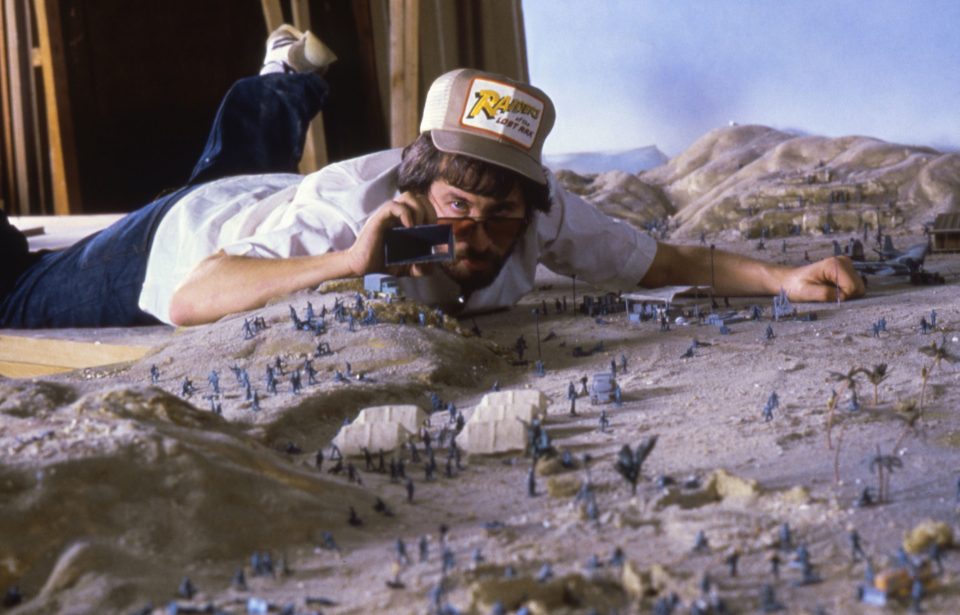June 12, 2021, marks the 40th anniversary of Raiders of the Lost Ark blazing across our cinema screens. With the fifth and final Indiana Jones movie in production right now, it seemed a good time to look back at one of Hollywood’s most beloved adventurers.
Everybody loves to see Indy fighting his way out of impossible situations, rescuing valuable treasures, and fighting dastardly bad guys — but how much of Indy’s adventures are based on real life, and how many aspects were merely dreamed up by co-creators George Lucas and Steven Spielberg? And what tricks and effects were used to bring our favorite adventurer to life?
Peru and Tanis
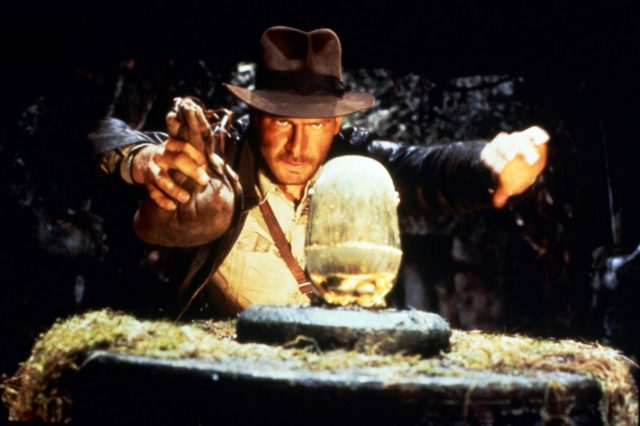
Indy’s attempt at recovering the golden idol from Peru seems to have been a mixture of fiction and fact. The tribe that pursues him is the Hovitos tribe, descendants of the Chachapoyas. While the Hovitos are made up, the Chachapoyas were a real tribe that lived in the cloud forests of present-day Peru, earning them the name “Warriors of the Clouds.”
The scenes were not filmed in Peru, however, but on the island of Kaua’i, Hawaii, which was also used in the filming of Jurassic Park (1993).
Indy’s search for the Ark takes him to Tanis, which is a real place in Egypt. The city was once a seat of power for the pharaohs but was abandoned in Roman times. The most notable parts of the ruined site are large obelisks that were felled by an earthquake in the Byzantine era.
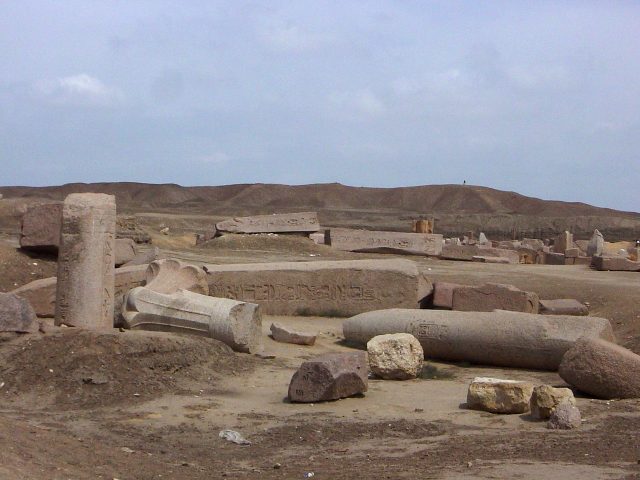
If the mountain won’t come to Spielberg…
When he was a kid, Spielberg would often try to mimic the famous Paramount logo with nearby natural scenery. So when he got the chance to work on a real Paramount picture, he couldn’t resist the opportunity to do the same for his opening shot.
He made producer Frank Marshall drive around the island of Kaua’i, Hawaii, until he found a suitable location they could use. Marshall eventually chose Mano Peak on Kalalea Mountain as being the best candidate.
The Third Reich’s obsession with the occult
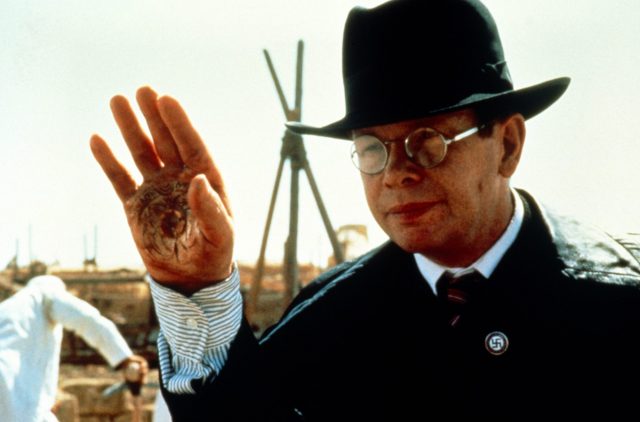
The movie’s plot has it as being essential that Indiana Jones get to the Ark of the Covenant before the Nazis do. While there’s no indication that the Nazis ever sought the Ark specifically, it’s widely believed that the Nazis were obsessed with the occult.
Films like Raiders of the Lost Ark and books like The Spear of Destiny have contributed to this idea. Yet while there is some truth that the Nazis had an interest in the occult, it seems that the extent of that interest has been exaggerated. Certainly, the idea that Hitler was possessed by a demon doesn’t seem to hold up to close scrutiny.
Spaghetti-O’s and swordfight
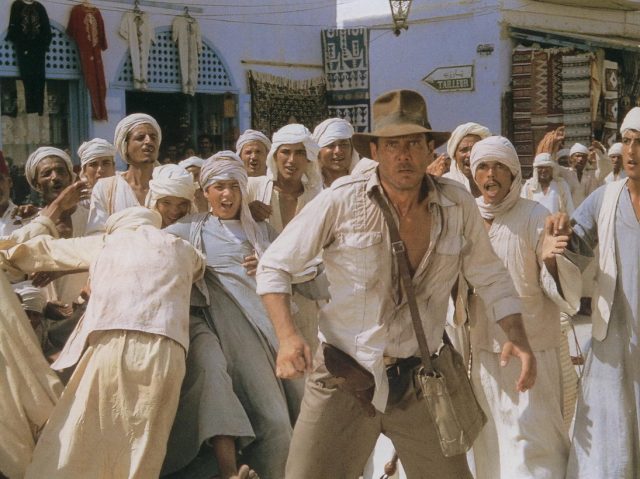
One iconic scene came about completely by accident. When Indy is running from the enemy in Cairo, he comes face to face with a skilled swordsman. The original script had Ford whipping the sword from the man’s hand with his bullwhip. However, after several takes, it just wasn’t working.
As well as coping with the intense heat, many of the crew — including Harrison Ford — were suffering from food poisoning. Exhausted and ill, Ford asked Spielberg if he could just take his gun out and shoot the man to get the scene over with. Spielberg loved the idea and the scene was filmed that way.
Incidentally, Spielberg was the only one who didn’t get sick because he’d brought lots of cans of Spaghetti-O’s with him, so he didn’t need to eat the local food. Instead, he subsisted on canned food and water that he kept in a chest in his hotel room.
The Ark of the Covenant
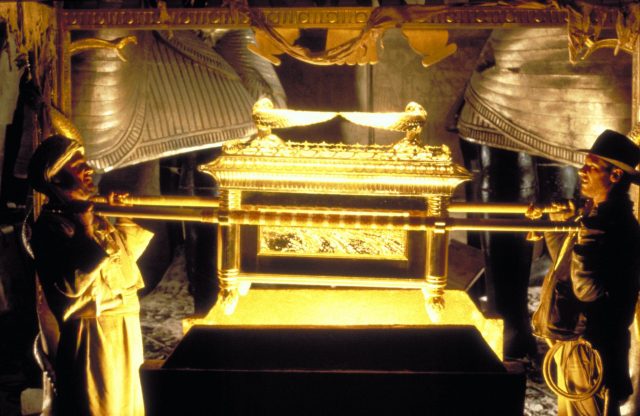
While the golden idol in the opening scenes doesn’t appear to be based on any specific artifact, the Ark of the Covenant has a basis in real life. It was supposed to be a large, ornate chest that housed the Ten Commandments. Accounts suggest that it was made of gold-plated wood, was carried by two poles inserted through rings on its side, and was topped with two golden angels — much like it appeared in Raiders of the Lost Ark.
The idea to have Indiana Jones and the Nazis searching for the Ark came from screenwriter Philip Kaufman. Although Kaufman wasn’t associated with the project for long, he is given a “Story By” credit because he was responsible for this central plot point. Allegedly, he chose the Ark because he’d been fascinated by it since childhood.
However, the Ark hasn’t ever been associated with Tanis, and its whereabouts remain one of the greatest historical mysteries. It allegedly disappeared when the Babylonians conquered Jerusalem in 587 BC.
Indiana Jones was indeed named after a dog
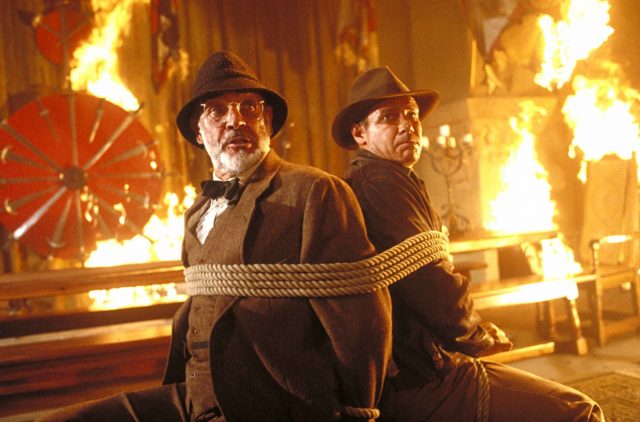
In Indiana Jones and the Last Crusade, Henry Jones (Indy’s father, played by Sean Connery) reveals that Indiana’s name is actually Henry Jones Junior. “I like Indiana,” the hero replies, to which his father responds: “We named the dog Indiana.”
This isn’t actually too far from the truth. George Lucas owned an Alaskan malamute named Indiana. Lucas, Spielberg, and screenwriter Lawrence Kasdan wanted their adventurer’s surname to be nondescript. Originally, the character was supposed to be Indiana Smith, but this was felt to be too close to Nevada Smith, so Jones was chosen instead.
Archeologists really did act that way (sort of)
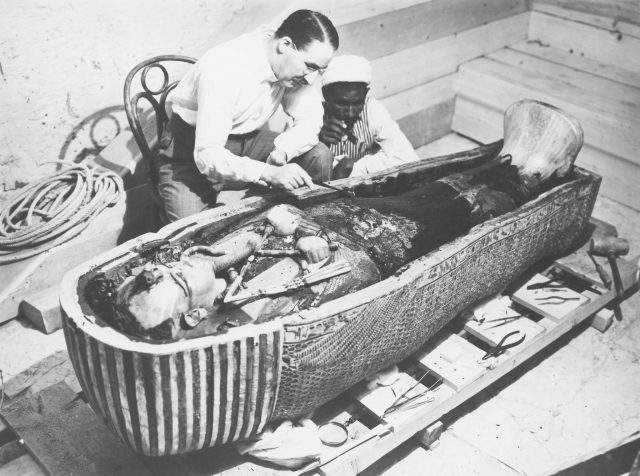
While not all archeologists in the 1930s might have had their own fedora and bullwhip, there was still plenty about Indiana Jones that reflects the profession at the time.
Firstly, archeology was made up primarily of white men, according to Bill White of the University of California, Berkeley, when he spoke to Smithsonian Magazine. Secondly, White points out that many of Indy’s ethics mirror that of archeologists of the time. Safety precautions were often ignored, as were the wishes of indigenous people. They also had no compunction about destroying archeological sites rather than preserving them.
Things are different today. Adrian Whittaker, an archeologist with CRM firm Far Western Anthropological, also told Smithsonian Magazine that archeologists today work with local communities “to identify and protect resources from destruction.”
Bring in the girls and the grapes
As the Hollywood saying goes: “Don’t work with children or animals.” The crew of Raiders of the Lost Ark certainly had to be creative when it came to working with both spiders and a monkey.
In the opening scene, Indy and his companion Satipo (played by Alfred Molina) are creeping towards the golden idol when Satipo pauses to swipe a few spiders from Indy’s back. When Satipo then turns around for Indy to do the same, his back is covered with them.
Unfortunately, during the first two takes, the tarantulas on Molina merely clung on, motionless. Spielberg wanted them to crawl around and queried why they weren’t. The animal wranglers explained they were all males and weren’t acting aggressively. The solution was to put a female on Molina’s back, at which point the males started acting aggressively and the scene worked.
Another tricky animal shot was the one requiring a monkey to give a Nazi salute. The animal trainers worked hard before shooting began to teach the monkey how to do this. The monkey knew what to do but just would not perform for the camera. In the end, the crew dangled a grape on a fishing pole and filmed the monkey reaching for it. The whole thing took several days and 50 takes just for those few seconds of footage.
Incidentally, the monkey’s voice is supplied by Frank Welker, who went on to provide the voice for Abu, the monkey in Disney’s Aladdin (1992).
I hate snakes…
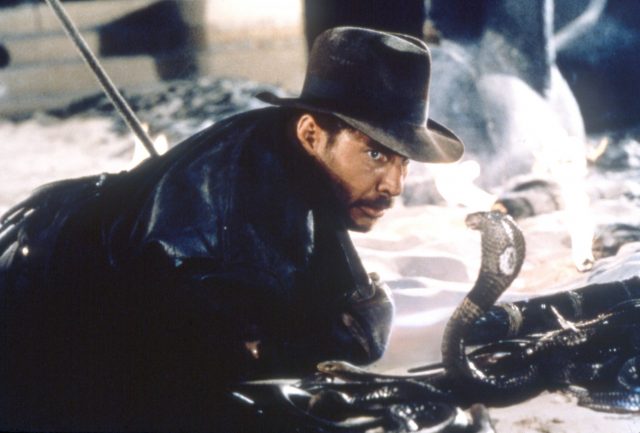
Harrison Ford, unlike Indy, isn’t afraid of snakes — which is just as well because the shot in the Well of Souls required 10,000 snakes.
Initially, the production team only sourced about 2,000 snakes, but this wasn’t anywhere near enough to cover the entire set. Displeased with how sparse the scene looked, Spielberg set the producers the task of scouring all the pet shops in London and various suppliers abroad to get more animals. The next time everyone turned up at the set at Elstree Studios, there were plenty of snakes to satisfy even Spielberg.
It belongs in a museum!
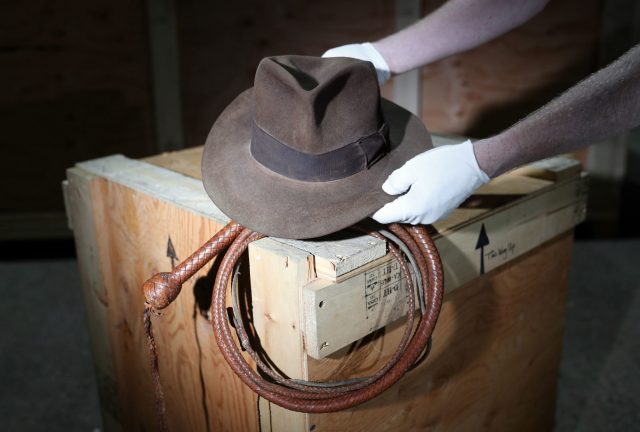
One of the most famous phrases from the film is now horribly outdated. Today, the attitude of archeologists is more focused on keeping archeological finds within the community they belong to. Sven Haakanson told Smithsonian Magazine: “I could be angry that this object is in a museum and not owned by the original people… we need to bring belongings and knowledge back to the communities.”
As such, some modern archeologists have a policy of not providing items discovered to a private collector or focusing on repatriation. But the profession still has a long way to go, and the final shot with the Ark being placed in a government warehouse does reflect the endpoint for some artifacts today.
Not everyone laughs at the same thing
Although the swordfight scene was a hit with audiences and has been parodied many times since (including in the sequel Indiana Jones and the Temple of Doom), Lucas was not convinced at the time that it would work. However, when test audiences responded well to it, he agreed it could stay.
Spielberg managed to sneak in a gag that he’d had to abandon in an earlier movie. When Gestapo officer Toht interrupts Marion and Belloq in the tent, he pulls out a complicated device that looks like it has a sinister purpose but ends up being nothing more than a coat hanger.
Spielberg had originally wanted to use it in his film 1941, where Christopher Lee interrogates Slim Pickens. However, the test audiences didn’t find it funny, so it was scrapped. Spielberg was able to take a darker turn with Raiders of the Lost Ark, and it worked.
More from us: Filming Begins For Fifth And Final ‘Indiana Jones’ Movie
Its effortless blend of fact and fiction along with a hefty dose of adventure and humor has ensured that Raiders of the Lost Ark is still an enjoyable film 40 years later.
Fans of Indiana Jones are watching the progress of the new movie with interest. With this fifth film promising to be the final one, everyone is hoping for something as memorable as Raiders of the Lost Ark.
